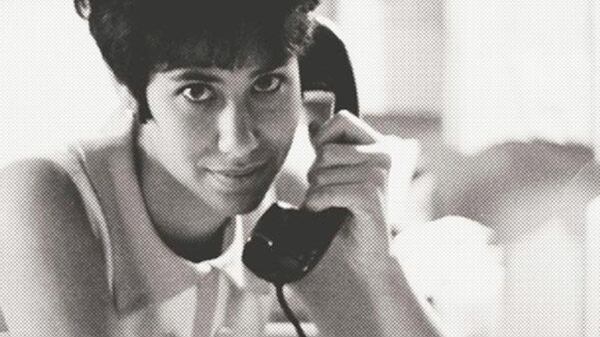They were told that “women don’t write here.” That, though they had attended Seven Sisters colleges, graduated with honors, and had the same lofty aspirations as their male colleagues, they were merely there to push carts of mail, clip stories from newspapers, fact-check, and occasionally mix a cocktail for an editor. Nora Ephron had been a mail girl at Newsweek in the 1960s, as had Susan Brownmiller, the feminist writer. But both escaped early—before, you might say, the women got fed up.

Lynn Povich was among that group of women who finally decided to buck the system. In her new book, The Good Girls Revolt, she documents how, in 1970—after months of secret plotting in the ladies’ bathroom—she and 45 other women sued Newsweek for gender discrimination, the first lawsuit of its kind.
Though the Newsweek suit was groundbreaking, decades later it had all but disappeared from the magazine’s institutional knowledge. In 2009, amid frustrations of their own, three young women started to investigate tales of a gender-based lawsuit against their employers some 40 years earlier, for a piece that would ultimately appear on the magazine’s cover. Two of the three authors of that piece, Jesse Ellison, a Newsweek writer, and Jessica Bennett, now the executive editor of Tumblr—the third writer, Sarah Ball, is now an editor at Vanity Fair—talk to Povich about women, work, and feminism then and now.
Bennett & Ellison: Describe what it was really like to be a woman at Newsweek in the 1960s. Was it as much like Mad Men as it seemed?
Povich: At Time magazine, they had mail boys, but at Newsweek only young women were hired to deliver the mail, rolling their carts down the halls in their proper shifts and high-heel shoes. Then you graduated to clipper and finally to researcher—or fact-checker. But the office was exciting. The wires were clacking, the phones ringing, and you had an inside line to the great matters of the day. There was a lot of drinking—inside the office and out—and on Friday nights, a lineup of black sedans would wait until we finished at one or two in the morning and whisk us back to our minuscule apartments. It was the Swinging Sixties, so there was a lot of sex between the male bosses and the young women—most of it consensual. But there was some inappropriate sexual behavior and instances where favors were asked—or given—to further one’s career.
Bennett & Ellison: What was it like having your editors tell you women couldn’t write? Did it start to make you think you really weren’t capable?
Povich: Most of us who were hired in the early-to-mid-1960s didn't know what we wanted to do, or even if we wanted to have a career. The women who came to Newsweek knowing they wanted to be journalists—like Nora Ephron, Susan Brownmiller, Ellen Goodman, and Jane Bryant Quinn—saw that it wouldn't happen, and left fairly quickly to develop very successful careers elsewhere. But when the rest of us saw that guys who graduated from the same schools without any professional experience got hired as reporters and writers over us, that's when we decided to do something. But we were so insecure and so intimidated about trying out as writers that we asked a few guys to teach a writing course for women. And even after women succeeded at that, progress stalled. The editors seemed to think that Newsweek writing was a special talent one was born with—but somehow only men were born with it.
Bennett & Ellison: You announced your lawsuit the same week that Newsweek published a cover story about the women’s movement, under the headline “Women in Revolt.” One of our favorite headlines of the day, from the New York Daily News, was “Newshens Sue Newsweek for 'Equal Rights.’” But what was the internal reaction?
Povich: We planned to announce our suit when the cover came out so we would get a lot of publicity—and we did! Most of the writers and reporters, with whom we worked every day, were supportive. But, as in many organizations, the real discriminatory behavior resided with middle management—in our cases the senior editors. The editor of the magazine at the time, Oz Elliott, got it right away and wanted to make change, but when he moved to the business side for two years, his executive editors were recalcitrant—so we had to sue a second time. Then we got everything we asked for: that one-third of the writers and editors be women and, very importantly, that one-third of the researchers be men, to show that it wasn’t a woman’s job. Our last demand was for a woman senior editor. I was appointed to that position in 1975.

Bennett & Ellison: Only white women were involved in the original suit, and they were represented by a black civil-rights attorney, Eleanor Holmes Norton. But there were female African-American reporters and researchers at Newsweek at the time—why didn’t they join the suit?
Povich: The black women were torn. Their primary allegiance was to the civil-rights movement, and years later they told me that they felt like an afterthought to our problems. They had to work, and they were concerned about their men and the family and racism and not just about getting ahead. I think they decided not to join us before we hired Eleanor Holmes Norton, and she may not have known about their decision. She told me later that she would have convinced them to join because she believed black women should be part of the women's movement.
Bennett & Ellison: The president and publisher of Newsweek at the time was Katharine Graham—a woman. How did she respond?
Povich: Katharine Graham went through her own form of consciousness-raising during this period. When she was told that the women had sued the magazine, she asked Oz Elliott, "Which side am I supposed to be on?" That reflects the confusion of so many women at the time.
Bennett & Ellison: Were you shocked to get a call from three young women, 40 years later?
Povich: I was thrilled that you all were interested, but I must say I was appalled that no one knew about it—even at Newsweek! That the morgue—Newsweek's rich library of clippings and files—had been sent to Texas, and there wasn't a shred of evidence of what we had done.
Bennett & Ellison: It probably only reinforced for you that this story needed to be told.
Povich: I was a history major, and I do believe that you can’t figure out where you’re going unless you know where you came from. I wanted to tell our story so it wouldn't be lost. I also wanted to talk about a generation of women who came of age in the 1960s—polite, apolitical girls raised to keep our ambition under wraps, to be wives and mothers—who challenged those stereotypes and took on the system.
Povich: But let me turn this interview on you two. How did finding out about our lawsuit influence you?
Bennett: Well, it took the three of us a combined decade-plus at Newsweek to even realize there had been a lawsuit. So, that’s pretty appalling. But, like you said—in order to understand our own history, we needed to understand yours. I remember reading passages from Susan Brownmiller’s book In Our Time that mentioned the suit, and saying, over and over again to Jesse, “It’s so similar to how it is now.” The politeness, the Town Cars home, the fact that the top editors were still called “Wallendas”—after the high-flying, but disastrous, circus act—it was all just like it had been. It was, as Nora Ephron had told us, a lovely place to work—especially if you were a man.
Ellison: I think what was most critical was the fact that the experience of reporting out the piece, and of course meeting you and the others, really helped us understand that what we were experiencing wasn’t our problem, it was a problem. Understanding that it was much bigger than ourselves in turn helped us stop blaming ourselves or feeling like we were somehow unworthy on an individual level. And I think all of us started approaching stories and subjects with sort of a new lens. I think everything I’ve written since was somehow informed by this piece.
Lynn Povich: Now, be honest. What was the internal reaction to your piece?
Bennett: We submitted the piece without our names on it, so that should tell you pretty much everything you need to know. Like your generation had 40 years earlier, we too reported and researched in secret—heading off into little private pods to discuss our day’s interviews, figuring out what we’d tell our editors, and reporting back to our mentor on the piece, who was helping us, again, in secret. The thing was, in the Internet age, it was impossible for Newsweek to ignore this piece—they knew that if they killed it, somebody else would run it, and it’d look a whole lot better if Newsweek proudly discussed what had been a historic moment, and whether there was still room to grow, than had the piece ended up on Gawker. Eventually, we came forward with our names. The editor at the time, Jon Meacham, “recused” himself from being involved in the editing process. We went through probably a dozen rounds of editing. Every senior editor in that building came back with comments, including the president of the Washington Post Company, Ann McDaniel. We were hopeful that real change would happen—and then, of course, all shit hit the fan. Though, then again, Tina Brown has often said that a merger has accomplished what a lawsuit couldn’t—that is, a woman at the top.
Lynn Povich: One of the things that interests me about your generation is the lack of confidence among young, talented, ambitious women like you. Both of you told me that you initially had trouble identifying what you were experiencing as “sexism,” and instead blamed yourselves for not succeeding like the men. Why aren’t you more sure of your skills?
Ellison: I think, in some sense, being told we could do and be anything we wanted might have been part of the problem. We’d done so well in school, and were used to excelling. We arrived at work thinking that we could do anything we wanted, and that sexism was a thing of the past—or at least something that didn’t affect people like us. But the reality was that we were working in an institution that just 40 years earlier had explicitly told women they weren’t good enough to write for the magazine. It takes a long time and—as you have pointed out—a lot of vigilance to undo a legacy like that. I think the reality is that we were still butting up against sexism. It’s not as overt, obviously, but it’s still there. And breaking into a boys’ club, feeling like you belong there and your ideas are valuable and you’ve got as much to offer as the guy sitting next to you, when there are very few female role models or anyone to encourage you or act as a mentor ... well, it was hard.
Lynn Povich: Sheryl Sandberg has talked about an "ambition gap" among young women today. Do you think there’s any truth to that?
Bennett: I don’t think it’s an ambition gap, but a confidence gap. I cannot tell you how many times I’ve been in meetings with women who have impeccable research abilities, bright, talented women, who, despite knowing that they have a good idea, or a great pitch, begin their sentences with, “I’m not sure if this is a good idea, but ...” And, to the other end, I can’t tell you how many men I know who, despite having a total bullshit idea, without an ounce of research, will clear their throats, put on their most authoritative voice, and convince a room that whatever it is they’re selling is the greatest idea ever known to, well, man. And, the worst part: you see editors, business executives, bosses—both male and female—fall for this, time and again. Why are women so afraid to own their voices, their opinions? Why can’t we be confident without being afraid we’ll be seen as pushy, or a bitch? Why, when we first began noticing in our own workplaces that something was amiss, did we immediately assume that the problem was us, not the system? There’s a lot to unpack there, but I don’t think it has anything to do with a lack of ambition.
Bennett & Ellison: Lynn, how do we solve the problem?
Povich: First, there still is a boys’ club at the top of many organizations. Men who respect and enjoy working with women promote them. Men who are more comfortable around men, don’t. I also think that the Corporate Suite isn’t very welcoming for people with children, especially women who still are primarily responsible for raising the kids. In this day and age, and with technology, you’d think there would be more flexibility to do the job, but alas there isn’t. But with more women graduating from college than men—and with the kind of skills needed in a knowledge economy—I hope that will change because companies will need women. Finally, I think young women do have to push themselves forward, take more risks, and once in management positions, help change the corporate culture to make it more equal.
Povich: And you guys?
Bennett & Ellison: One of the things that came up for us when we were talking about and working on our story was how much we were missing female role models and mentors, so we’ve tried to be cognizant of being more available and accessible to young women. There should also be absolutely no excuse for a lack of women writers on magazine pages—the old “I don’t get pitched,” “I don’t know any women writers,” is bullshit. But, also—for women like us—call out inequity when you see it! There is still a culture of shame around discussing this stuff—and it makes it so, so easy to brush it under the rug. All these byline counts, all the monitoring of the number of stories written by women, calling out accused sexual harassers, creating alternatives to male-dominated publications—just generally speaking up—that’s huge. It forces the issue. And even 40 years later, it’s clearly an issue that needs to be forced.


